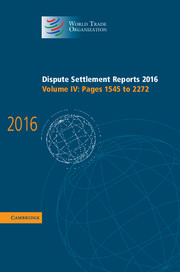Book contents
- Frontmatter
- Contents
- Russia - Tariff Treatment of Certain Agricultural and Manufacturing Products (WT/DS485): Report of the Panel
- India - Certain Measures Relating to Solar Cells and Solar Modules (WT/DS456): Report of the Appellate Body
- India - Certain Measures Relating to Solar Cells and Solar Modules (WT/DS456): Report of the Panel
- Cumulative List of Published Disputes
India - Certain Measures Relating to Solar Cells and Solar Modules (WT/DS456): Report of the Appellate Body
Published online by Cambridge University Press: 24 July 2020
- Frontmatter
- Contents
- Russia - Tariff Treatment of Certain Agricultural and Manufacturing Products (WT/DS485): Report of the Panel
- India - Certain Measures Relating to Solar Cells and Solar Modules (WT/DS456): Report of the Appellate Body
- India - Certain Measures Relating to Solar Cells and Solar Modules (WT/DS456): Report of the Panel
- Cumulative List of Published Disputes
Summary
INTRODUCTION
India appeals certain issues of law and legal interpretations developed in the Panel Report, India – Certain Measures Relating to Solar Cells and Solar Modules (Panel Report). The Panel was established on 23 May 2014 to consider a complaint by the United States against certain domestic content requirements (DCR measures) imposed by India on solar power developers (SPDs) selling electricity to governmental agencies under its Jawaharlal Nehru National Solar Mission (NSM). The DCR measures at issue require that certain types of solar cells and modules used by SPDs be made in India.
The NSM was launched by the Central Government of India in 2010, and aims to generate 100,000 megawatts of grid-connected solar power capacity by 2022. The stated objective of the NSM is “to establish India as a global leader in solar energy, by creating the policy conditions for its diffusion across the country as quickly as possible.” The NSM is being implemented in several successive “Phases”, with each phase thus far initiated being further divided into “Batches”.
The DCR measures in Phase I (Batch 1), Phase I (Batch 2), and Phase II (Batch 1-A) are each set forth, reproduced, or otherwise reflected in a series of different documents, including the so-called “Guidelines” and “Request for Selection” documents, the model power purchase agreement (PPA), and the individually executed PPAs between the relevant Indian governmental agencies and the SPDs. Each individually executed PPA sets out a guaranteed rate for a 25-year term at which the electricity generated by the SPD will be bought by the Central Government. The government resells the electricity that it purchases to downstream distribution companies, which in turn resell it to the ultimate consumer.
The Panel, having reviewed all of the evidence provided relating to each Batch, carried out its analysis on the understanding that, for each Batch, the measure at issue is the DCR measure reflected or incorporated in the various documents for each Batch, read together in a “holistic” manner. The Panel therefore did not treat the separate documents in each Batch as distinct measures.
A mandatory DCR was imposed on SPDs participating in Phase I (Batches 1 and 2) and Phase II (Batch 1-A) of the NSM.
- Type
- Chapter
- Information
- Dispute Settlement Reports 2016Volume IV: Pages 1545-2272, pp. 1827 - 1940Publisher: Cambridge University PressPrint publication year: 2017



